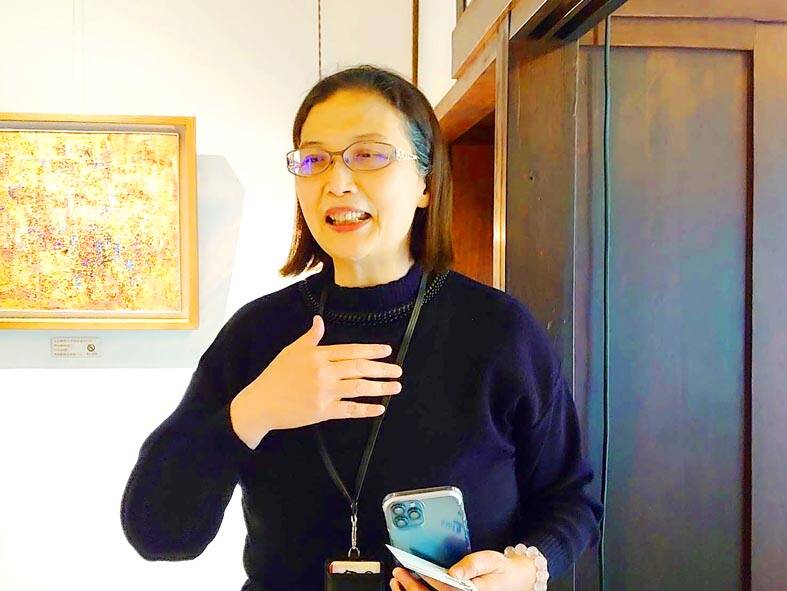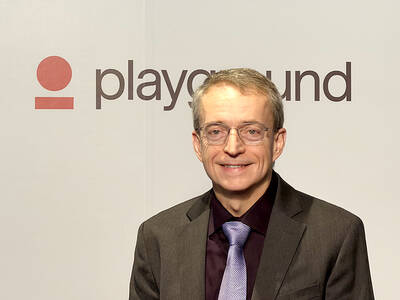GlobalWafers Co (環球晶圓), the world’s third-largest silicon wafer supplier, yesterday said it would take longer for the company’s new US fabs to break even if it did not secure chip subsidies from the US government as estimated previously.
The company’s remarks came as US President Donald Trump’s call yesterday to scrap the US CHIPS and Science Act, or the US$52 billiion semiconductor subsiday program, stoked concerns about the profitability of its two new advanced fabs in Texas and Missouri.
GlobalWafers said its decision to expand in the US is a commercial one driven primarily by the demands of its US customers. In the unlikely event the CHIPS Act is modified and impacts the company's business, GlobalWafers would reassess future investments, including evaluating US market demand, pricing, and potential tariffs if production were moved outside the US.

Photo: CNA
“There are still lots of uncertainties out there, including tariffs, our product mix in the US and average selling prices,” GlobalWafers chairwoman Doris Hsu (徐秀蘭) told a virtual conference when asked about the timing for the US fabs to break even.
If the US implemented sweeping tariffs as planned, the costs of raw materials would surge, and so would average selling prices, Hsu said.
The company is uncertain whether silicon wafers would be included in the US tariff list, Hsu said.
Additionally, foreign exchange rates and the central bank’s interest rate policy also pose uncertainties to the industry, she said.
“So, for now, what we can say is that I think if there were no CHIPS Act fund, then our payback or breakeven time would take a little bit longer,” she said.
Under the CHIPS Act, GlobalWafers expects to receive the first batch of direct funding of US$406 million sometime this year. The grant represents 10 percent of the planned investments of US$4 billion in the two advanced semiconductor wafer manufacturing facilities.
Along with the tax credit, which is equal to 25 percent of the qualified investment, the total government funding would make up 35 percent of GlobalWafers’ investments in the US, it said.
As no official guidance suggests any changes, GlobalWafers is continuing with its original plan, and remain committed to its expansion strategy, it said.
The company plans to deliver wafers from its new US fab in the first half of this year.
Commenting on Taiwan Semiconductor Manufacturing Co’s (台積電) additional US$100 billion investment in the US, Hsu said that “is good news for us.”
“As a key supplier, I think we definitely have to prepare ourselves to be able to meet customer demand,” she said.
“If we have strong demand in the US and cost-competitive operations in Texas and Missouri, and our US customers are willing to make long-term commitments, we will be very willing to expand further, but that would depend on our business performance,” she said.
GlobalWafers yesterday reported an 89.3 percent slump in net profit for last quarter, which it attributed to sagging demand amid a prolonged inventory correction at customers.
Net profit sank to NT$475 million (US$14.48 million), compared with NT$4.44 billion in the corresponding quarter in 2023. That also represented a sequential decline of 84 percent from NT$2.95 billion.
Last year as a whole, GlobalWafers’ net profit plummeted 50 percent to NT$9.84 billion from NT$19.77 billion in the previous year. Earnings per share dipped to NT$21.06 from NT$45.41.
The company expects a more marked recovery in the second half of this year after hitting bottom in the first quarter, on expectations that silicon wafer consumption would increase due to growing demand for advanced packaging technology and artificial intelligence devices, it said.
“We have witnessed some rush orders and customers are requesting quotations from Globalwafers’ global facilities,” the company said. “We expect our business to grow this year compared with 2024, with an even stronger increase projected for 2026.”
It remains a challenge for the company to maintain gross margins at the same level as last year’s 31.6 percent, due to increased depreciation and uncertainty in electricity costs, the company said.

The number of Taiwanese working in the US rose to a record high of 137,000 last year, driven largely by Taiwan Semiconductor Manufacturing Co’s (TSMC, 台積電) rapid overseas expansion, according to government data released yesterday. A total of 666,000 Taiwanese nationals were employed abroad last year, an increase of 45,000 from 2023 and the highest level since the COVID-19 pandemic, data from the Directorate-General of Budget, Accounting and Statistics (DGBAS) showed. Overseas employment had steadily increased between 2009 and 2019, peaking at 739,000, before plunging to 319,000 in 2021 amid US-China trade tensions, global supply chain shifts, reshoring by Taiwanese companies and

Taiwan Semiconductor Manufacturing Co (TSMC, 台積電) received about NT$147 billion (US$4.71 billion) in subsidies from the US, Japanese, German and Chinese governments over the past two years for its global expansion. Financial data compiled by the world’s largest contract chipmaker showed the company secured NT$4.77 billion in subsidies from the governments in the third quarter, bringing the total for the first three quarters of the year to about NT$71.9 billion. Along with the NT$75.16 billion in financial aid TSMC received last year, the chipmaker obtained NT$147 billion in subsidies in almost two years, the data showed. The subsidies received by its subsidiaries —

Shiina Ito has had fewer Chinese customers at her Tokyo jewelry shop since Beijing issued a travel warning in the wake of a diplomatic spat, but she said she was not concerned. A souring of Tokyo-Beijing relations this month, following remarks by Japanese Prime Minister Sanae Takaichi about Taiwan, has fueled concerns about the impact on the ritzy boutiques, noodle joints and hotels where holidaymakers spend their cash. However, businesses in Tokyo largely shrugged off any anxiety. “Since there are fewer Chinese customers, it’s become a bit easier for Japanese shoppers to visit, so our sales haven’t really dropped,” Ito

OUTLOOK: Pat Gelsinger said he did not expect the heavy AI infrastructure investments by the major cloud service providers to cause an AI bubble to burst soon Building a resilient energy supply chain is crucial for Taiwan to develop artificial intelligence (AI) technology and grow its economy, former Intel Corp chief executive officer Pat Gelsinger said yesterday. Gelsinger, now a general partner at the US venture capital firm Playground Global LLC, was asked at a news conference in Taipei about his views on Taiwan’s hardware development and growing concern over an AI bubble. “Today, the greatest issue in Taiwan isn’t even in the software or in architecture. It is energy,” Gelsinger said. “You are not in the position to have a resilient energy supply chain, and that,